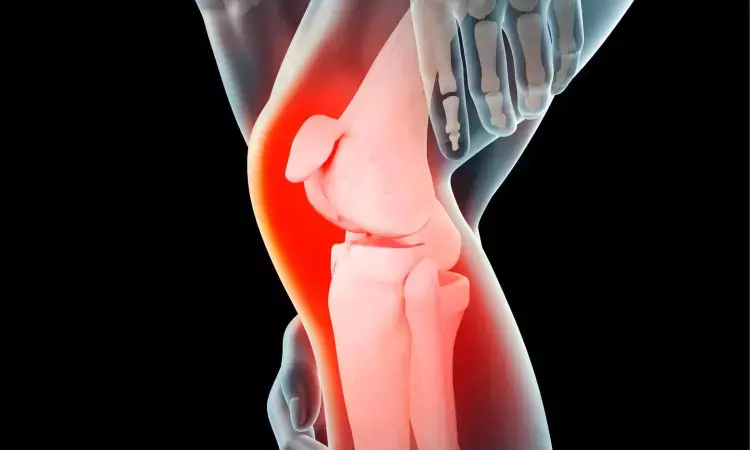- Home
- Medical news & Guidelines
- Anesthesiology
- Cardiology and CTVS
- Critical Care
- Dentistry
- Dermatology
- Diabetes and Endocrinology
- ENT
- Gastroenterology
- Medicine
- Nephrology
- Neurology
- Obstretics-Gynaecology
- Oncology
- Ophthalmology
- Orthopaedics
- Pediatrics-Neonatology
- Psychiatry
- Pulmonology
- Radiology
- Surgery
- Urology
- Laboratory Medicine
- Diet
- Nursing
- Paramedical
- Physiotherapy
- Health news
- Fact Check
- Bone Health Fact Check
- Brain Health Fact Check
- Cancer Related Fact Check
- Child Care Fact Check
- Dental and oral health fact check
- Diabetes and metabolic health fact check
- Diet and Nutrition Fact Check
- Eye and ENT Care Fact Check
- Fitness fact check
- Gut health fact check
- Heart health fact check
- Kidney health fact check
- Medical education fact check
- Men's health fact check
- Respiratory fact check
- Skin and hair care fact check
- Vaccine and Immunization fact check
- Women's health fact check
- AYUSH
- State News
- Andaman and Nicobar Islands
- Andhra Pradesh
- Arunachal Pradesh
- Assam
- Bihar
- Chandigarh
- Chattisgarh
- Dadra and Nagar Haveli
- Daman and Diu
- Delhi
- Goa
- Gujarat
- Haryana
- Himachal Pradesh
- Jammu & Kashmir
- Jharkhand
- Karnataka
- Kerala
- Ladakh
- Lakshadweep
- Madhya Pradesh
- Maharashtra
- Manipur
- Meghalaya
- Mizoram
- Nagaland
- Odisha
- Puducherry
- Punjab
- Rajasthan
- Sikkim
- Tamil Nadu
- Telangana
- Tripura
- Uttar Pradesh
- Uttrakhand
- West Bengal
- Medical Education
- Industry
Intra-incisional metaphyseal pins safe for use in patients undergoing robotic-assisted TKA

In a recent study conducted by researchers from the Cleveland Clinic, the use of intra-incisional metaphyseal pins during robotic-assisted total knee arthroplasty (TKA) was found to be associated with low rates of periprosthetic fracture and infection. This finding suggests that the procedure may be a safe option for patients undergoing robotic-assisted TKA.
This study, published in the Journal of Arthroplasty by Stetzer M. and colleagues, contributes to the growing body of research on surgical techniques in orthopedics and their impact on patient outcomes. The study included data from 2,343 patients who underwent robotic-assisted TKA, and the patients had 4-mm intra-incisional bone array pins fixed into the femur and tibia. The researchers examined outcomes related to periprosthetic fractures, infections, and reoperations.
The results of the study revealed that at 90 days postoperatively, only 0.09% of patients (equivalent to 2 patients) experienced a pin-related periprosthetic fracture. In addition, 1.4% of patients developed either a superficial infection (20 patients) or a deep infection (13 patients). Among the 1,655 patients with complete one-year follow-up data, the reoperation rate was 1.8% (29 patients).
The most common reasons for reoperation included deep infection (0.83%), superficial infection (0.18%), periprosthetic fracture (0.12%), mechanical symptoms (0.12%), instability (0.12%), and hematoma (0.12%).
Based on these findings, the researchers concluded that intra-incisional pin placement appears to be a safe technique with a very low incidence of fractures associated with pin placement. This information may be valuable for orthopedic surgeons and patients considering robotic-assisted TKA. It highlights the importance of safety and low complication rates in robotic-assisted TKA, providing valuable insights for orthopedic surgeons and the medical community.
Reference:
Stetzer, M., Bircher, J., Klika, A. K., Rullán, P. J., Bloomfield, M. M., Krebs, V. E., Molloy, R. M., & Piuzzi, N. S. Intra-incisional pin placement is safe for robotic-assisted total knee arthroplasty. The Journal of Arthroplasty,2023. https://doi.org/10.1016/j.arth.2023.10.050
MBBS, Dip. Ortho, DNB ortho, MNAMS
Dr Supreeth D R (MBBS, Dip. Ortho, DNB ortho, MNAMS) is a practicing orthopedician with interest in medical research and publishing articles. He completed MBBS from mysore medical college, dip ortho from Trivandrum medical college and sec. DNB from Manipal Hospital, Bengaluru. He has expirence of 7years in the field of orthopedics. He has presented scientific papers & posters in various state, national and international conferences. His interest in writing articles lead the way to join medical dialogues. He can be contacted at editorial@medicaldialogues.in.
Dr Kamal Kant Kohli-MBBS, DTCD- a chest specialist with more than 30 years of practice and a flair for writing clinical articles, Dr Kamal Kant Kohli joined Medical Dialogues as a Chief Editor of Medical News. Besides writing articles, as an editor, he proofreads and verifies all the medical content published on Medical Dialogues including those coming from journals, studies,medical conferences,guidelines etc. Email: drkohli@medicaldialogues.in. Contact no. 011-43720751


